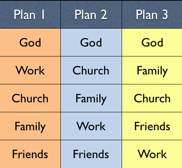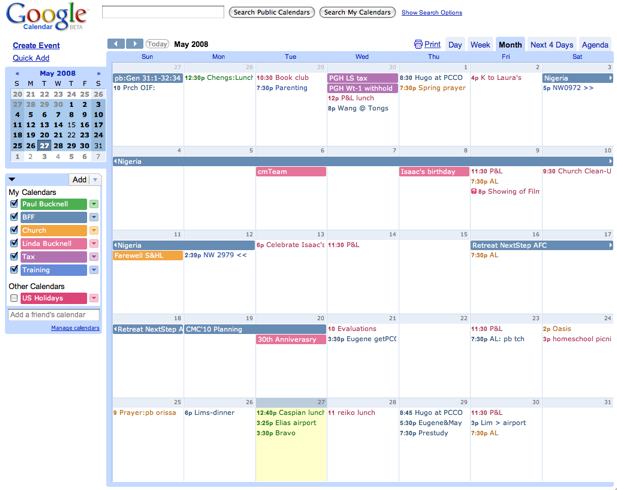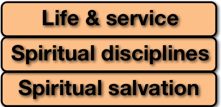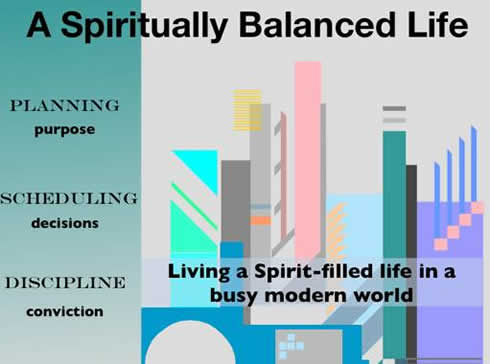
A Spiritually Balanced Life
Living a Spirit-filled life in a busy modern world
Rev. Paul J. Bucknell
Introduction + (S) | Schedule (CHED) | Schedule (ULE) | Workshop | For video and ppt get D3 Library |
This is the second in a series on Christian or spiritual scheduling and planning. The discussion continues by discussing CHED from the alliteration of Schedule: Christ-centered, Helpful, Edifying, Disciplined.
![]()
Christ-centered
“C” stands for Christ-centered planning. Christians make room for God in their new lives but not in the right way. God wants all the room.
I remember once a church is Russia. People had to walk through foot deep mud to get to worship, but they got there and more people would keep coming. It finally came about that those coming late would not find any room to sit. They would go up the inside aisle and find a tiny room on the end of one the long row of flat benches and sit down.
Everybody starting from the inside aisle would budge over a bit. But when it came to the last person, after twenty people did this, they had no seat left and would have to stand! When God comes in our lives, there is no room for anyone else. Most Christians would assert this as they do in the two following models, but they do not understand what it means.
The Priority Category Model
- A not so good plan -
Many believers use the listing method to discern priorities. They find out which is most important and then make it a priority over another category. And so they go arranging their priorities one after another in order of importance.
There are several problems with this. Even though everyone says that God is first, we find that they begin to separate God out of certain parts of their lives. It becomes thoroughly unbiblical even though it is commonly practiced. Let’s think each plan through for a moment.
In Plan 1 this person is a believer. Christ is important; God gets the number one place. In his mind work comes next. This is what takes up most his time and anyway, if he didn’t work, he couldn’t live and care for his family. We can see that with this mindset he could easily overlook needs in the church and family.
In Plan 2 this person thinks of himself as spiritual. Church is at the top of the list, next to God, of course. He attends every meeting and people are impressed by his or her devotion. The problem is that his or her boss has given an unfavorable interview. Not only that, people around that person start complaining about being ‘dropped’ by this super spiritual friend.
In Plan 3 this person has seen what happens when a person puts work or ministry above the family. The marriage goes from bad to worse. He doesn’t dare take on any ministry that will call for any sort of sacrifice to the family. They steadily go to church and seem stable but something seems missing. They are unwilling to give in order to protect their family.
There are many different listings of priority but they all fall short because it is based on an unbiblical categorization of priorities. Let me ask a simple question, “When is a husband to love his wife?” The answer is obvious–always. Does this mean the husband will put his wife at the top of the list? But then how will he love God with all his heart or his neighbor to whom he is to love as himself? Simple problems like this highlight how this category kind of prioritization fails.
The Priority Wheel Model
- A Better way to live our lives -
The reason the above categorical method is unbiblical is that it causes us to state some things are not important when they are. When we allow some areas to be unimportant, we will advance some areas while neglecting others. The Biblical method suggests that we do what Christ did. He prioritized all of the things that God His Father wanted Him to do. This might seem impossible or strange at first, but it does work out. Colossians 1:10 summarizes this wheel model.
“So that you may walk in a manner worthy of the Lord, to please [Him] in all respects, bearing fruit in every good work and increasing in the knowledge of God.”
There are two major parts to it.
#1 God stands at the center.
God the Father is our focus. We are to please Him. We are to walk in a way that pleases Him. The wheel model has Christ at the center or the hub of the wheel and so the worship (i.e. service) of God stands at the center focus of our lives.
When God is at the center of our hearts and lives, then we can safely assume that He will help us live faithful in our whole lives just as Proverbs 3:5-9 stated. God doesn’t take us out of the world to live for Him but goes with us into the world.
#2 Each area is holy.
As we seek to please Him, we realize that He is best able to help us rightly live out our lives. Far from the secular mindset, we find God wants to enter each aspect of our lives so that His wisdom, love and ways are lived out. As we serve God, we have Him lead us in every sector of our lives. Our whole lives are holy.
From the wheel below, note a few areas of our lives that God wants to enter: church, studies, ministry, work, family, interests, etc. Let’s look at a tough situation from Mark 3:31-34 to think through how this might work out.
“And His mother and His brothers arrived, and standing outside they sent word to Him, and called Him. And a multitude was sitting around Him, and they said to Him, “Behold, Your mother and Your brothers are outside looking for You.” And answering them, He said, “Who are My mother and My brothers?” And looking about on those who were sitting around Him, He said, “Behold, My mother and My brothers!” (Mark 3:31-34).
We are surprised at Jesus’ answer to those trying to get Jesus’ attention on the behalf of his family. Was it true that Jesus did not care for His family? No. It was not a question of importance but of priority. Their needs are important but could be fulfilled later after the meeting. Those at the meeting, however, would not be able to see Him later. They had needs at that very point in time. Jesus affirmed everyone is valuable. He met His family differently, however, and at a different time when most appropriate.
Jesus many a time left the needs of one group to minister to another. How was He to deal with the conflict of need? He did three significant things: (1) He spent special time with His Heavenly Father; (2) He remembered to guide His decisions under the general umbrella of His mission to spread the Good News throughout Israel to God’s people and (3) He began to train others to do what He was doing.
Jesus highlighted His means of prioritization by this statement, “Jesus said to them, “My food is to do the will of Him who sent Me, and to accomplish His work”” (John 4:34). We see Jesus’ confidence in God His Father to lead and empower Him in this statement. When Jesus focuses on His full devotion to the Father, then the Father will guide Him as to what He should do, when He should do it, how He should do it, etc. If the Father does not specially say anything, then we can assume that we do not need to know anything special for a given situation.
As we go on, we hopefully will discuss more how to listen to the Father. “C” is for a Christ-centered schedule. We focus on serving God as Christ did. All aspects of our lives are important. We must guard all our time to preserve it for carrying out the purposes of the Lord.
Helpful
“H” is for helpful planner. Most everyone should have some kind of planner or calendar, (though I am sure Jesus did not have one!) I want to say everyone, but there are exceptions. Planners serve different purposes. They play and important role in time-oriented societies. We have appointments. Our certain meeting times and work times are scheduled by accurate times.
A helpful planner will be comprehensive and yet not overwhelming. There are daily, weekly and monthly calendars. For very busy lives or longer trips a yearly calendar will need to be accessible such as our church calendar. I find it sufficient to keep a rough calculation of when significant times occur in the distant future. We should not be late - keep others waiting, nor should we have to say, “I forgot.” A good planner helps us in three significant ways: past, present and future.
Past
I often use my calendar as a means by which I accurately keep records for the past. One might want to get an overview on when one has met a person last or for personal records. The government offers mileage deduction for work and charity. It requires the miles, purpose and places to be written down. If they are not recorded and kept, then you should not take such deductions. I can claim it because it is written down.
Present
A calendar forms a good reminder of things to do. Some like to use big planners to make most of 15 minute time slots. This can have real advantage if one is a talkative person or gets easily distracted. A to-do column is great for people who forget various errands (or things one should get on the errand) or jobs around the house. (Remember a husband’s help around the home reminds the wife that her husband really cares for her).
Future
A calendar projected into the future helps us adjust our schedules as we observe when busy or slow times occur. We can prepare ahead and see where we need to find extra help. Although we usually pray for the ‘today,’ we should also be praying for upcoming events and ministry opportunities. A weekly or monthly calendar helps us plan ahead and see potential conflicts.
My suggestion for using a personal calendar
I now use a free online calendar (Google) that is shared between my wife and myself. Since it is online, I can use it from any computer without fearing that it is not the latest edition.

It allows me to have other people’s calendar on my own, such as my wife’s. In this way, I get a good perspective how we work out our lives together. I am able to share calendars with others if needed or turn them off if not wanting to view them. On the left you can see a number of different colored categories such as my wife’s, church, my ministry, tax dates, holidays, etc.
This online calendar is not enough. I also print one out. I suppose if I had one of those pocket gadgets, I would not need a paper one, but this has been my longstanding habit. I print four months on one piece of paper, two on each side. It is small and handy. It has enough future on it to make plans on the spot, but the spaces are not too small so I cannot write on each one. I write down addresses, phone numbers, meetings, etc. on it. Do you keep one?
Let me explain how I keep it. You might do it very different. That is fine. You need to see your life routine: your past, present and future needs. Use one and adjust it as you go. Some love book-sized planners. I do not find it helpful because I do not have many daily appointments. I do not like carrying one around. I recently went overseas and found a need for bigger space. So I printed off a full-sized monthly calendar, and it provided much more space. I carried both around when needed.
What to write down
I do not write everything down. In fact, I write very few things donw. I have regular days and my work and sleep hours are fairly fixed. My philosophy is that I work (the ministry) all the time when nothing else supersedes it. Since my work and ministry flow together as one, this mentality works. God works out each days special needs.
I work primarily at home. If I am not careful, however, then I would easily hurt people and cause lots of problems. What are things that can interrupt my schedule? A 15 minute power nap. Eating with my family. An occasional family event. Family devotions. Fixing things around the house. Nightly prayer times with my wife. Weekly date with my wife. Sleep. The only thing out of these that I put on the schedule is my wife because she likes to know I plan to be with her even though it usually is Friday noon.
I will talk about spiritual disciplines later. They are part of my life. I do not write the times I pray, meditate or fast down unless there are special reasons for it. These are already set in habit.
You might note long dark blue strips on the calendar. I was out of town on these days. Once I went overseas on a ministry trip and at another time to Lancaster for some ministry meetings. I do not take time to put the detailed schedule down on this little paper. If I need, I usually print out a special event time for those days or get an agenda from those hosting the meeting.
Busy times
What do I do when I am in extra busy times? I try to be extra sensitive to the Lord and people. Feeling people can make me prone not to be sensitive to the Lord and others He brings into my life. This past Thursday serves as a good example. It somehow seemed to be the day I needed to meet three people for 1 1/2 hour segments each. This did not seem to be so bad in and of itself, but since I had to speak three times on the coming weekend, I had to more carefully discern if I was to meet with each of these individuals.
I carefully thought through the needs of each person. Each appointment seemed important. I thought before the Lord if I should postpone any to next week. My time was ‘tight’ this week, but I did not want fear to shape my schedule. After looking at their needs, I trusted God to help me with the three larger time-demanding projects. I believed God would help me through them as He has done before. So I agreed to meet with the three individuals. I expect special grace for the messages.
“H” is for helpful planner or schedule. I use it where I need it. Perhaps because I have been doing this for many years, I have a fairly set routine. If what you are doing changes or is new and not firmly set, you should adjust your calendar to your schedule. If you need more structure because of changing circumstances or many appointments, write it down and follow it closely. If you are just starting off, just print one calendar a page and give more room to write. A planner or calendar must be helpful, readable, accessible and able to instantly remind.
Application: Do you have a planner or calendar? How do you use it? Do you find yourself planning too much or under-planning? Do you miss appointments or regularly go over time? Why? Work harder at getting your life and your calendar working together to accomplish the Lord’s will.
Edify & evangelize
“E” is for edify. Our schedules must build up the lives of others. We are not to live for ourselves. We are here to please God. What does He, our Father, want for us? This is the way our Lord lived His time on earth and it is the time that we are to live. Matthew 5:16 nicely summarizes our mission although there are many different passages that do this.
“Let your light shine before men in such a way that they may see your good works, and glorify your Father who is in heaven” (Matthew 5:16).
Jesus summarized all the commandments as two interlinked ones, love God and love others. This kind of life is focused. We are out to serve. We are propelled by the Spirit of God to use our time for His glory. Some people think that means all ministry to the neglect of their families. Let me explain what perhaps lay behind this problem.
If I would neglect a certain relationship, it is probably because I have not counted it as important. It is not important to gain my attention because I do not sufficiently value the person or situation. I remember once as a pastor listening to counsel suggest that I was ignoring the older singles. I was not being sufficiently sensitive to note this. I was not loving.
Love is proactive. Love calls me to monitor the needs of those around me. Loving God means that I put what is important to Him on my own heart and into my schedule. If I am proactively carrying out my responsibilities, then a crisis does not have to lead me. Love does. I should be closely monitoring these things in prayer to make adjustments before disaster hits. More will be said about this under “D” for discipline.
Fully dedicated
Look at your life as 7/24/365 to serve the Lord. Even your sleep is dedicated to the Lord. If it is interrupted by a special need of a sick child or a friend’s need of a ride to the hospital, do not begrudge it. Get excited the Lord has chosen you for this good work.1 It is all an approach to life. Remember the schedule is not holy. We are here to serve. We only have about 25,000 days. Use each one for the Lord and others.
Entertainment steals away many service hours. It has become a fetish for most. People use a lot of time and money on things that could otherwise be used. Each of us will need to give an account for these things. Web browsing, pet projects, movie-watching, computer games can drain our time. Be careful. Many are not bad in and of themselves but can keep us from serving. If we actively think about using all our time for the Lord, then we largely run out of time for these things.
Not all of us are full-time ministers, but it is quite clear that God has called each of us to live like Christ. We are to make disciples. Most of the people in our modern society will make sure their schedule includes entertainment. This is wrong. Please do not misunderstand me. I am not saying that it is wrong to watch a good and wholesome movie, rare they be. We need to cultivate rests and pauses into our lives as the teaching of the sabbath instructs us into imitate our Creator. I find it most helpful to look at special times with family, spouse or friends as special times of edifying. I want them to know God’s love through me. This is no less a love if I were to help a drunkard get back to his house. Let me give you an example.
My wife accepted to make a bridesmaid’s dress for my older daughter. She probably should not have. She is busy with coordinating our church’s children ministry, not to mention caring for the six younger children at home. She also was finishing up a year of homeschool and evaluations. She was overburdened. She had been for a couple of weeks. I was out of town for those weeks.
Perhaps she had not been handling the load quite right, but I did not want to say more about that. I was sensitive to her though and have been praying. I noticed the other day that she was standing by the back screen doorway looking out. A tear was coming down her cheek. I was surprised. She was crying. She felt overburdened. She mentioned she could not even think about supper. So I volunteered, busy week and all, to get supper! Now I do not cook, and it would cause her more consternation if I tried. But I volunteered to order and get pizzas. It helped her through a crisis time. We do not often order out for our large family, but the money here used was for ministry to my wife. It was not for us but to edify her this one time. God used it so she could focus on getting through some planning matters and finish that dress all later that evening.
“E” is for edify and evangelism. We are poised to build up the people around us. It is nice to be encouraged by those around us, but even if they do not, we still help and encourage them. If our contacts are non-Christians, we are deliberate in our love and evangelism.
Application
How closely do you monitor those around you? Do you sense the needs and blessings of those around you? Can you be sad or glad with them?
Disciplined
“D” is for disciplines or better known as spiritual disciplines. Spiritual disciplines become our life foundations because they enable God to enter our lives at the necessary points. We desperately need to hear from God. Spiritual disciplines include individual habits such as prayer, fasting, purity, journaling and daily devotions but also should include corporate ones such as Sunday worship, fellowship, ministry, prayer, etc. The list can be longer.
 Some Christians think of spiritual disciplines only in the individual sense while others would keep the list of spiritual disciplines to a few special spiritual habits. I look at all our disciplines as spiritual and so would include more, but not to confuse you, I will try to keep closer to what most people think of as spiritual disciplines.
Some Christians think of spiritual disciplines only in the individual sense while others would keep the list of spiritual disciplines to a few special spiritual habits. I look at all our disciplines as spiritual and so would include more, but not to confuse you, I will try to keep closer to what most people think of as spiritual disciplines.
When we think about spiritual disciplines in a broader way, then they begin to be much more practical. One does not introduce this whole concept to a new believer as it would overwhelm him or her. We allow the new believer slowly discover the significant habits of the mature. Anyone seeking maturity must carefully govern their lives to allow God to enter every part of their lives. There is no part that is sealed off from the Lord. We allow His light to shine in every dark area of our lives.
The lack of trust
The disciple of Jesus might respond with fear when he thinks of opening his life wide open to the Lord. The evil one is bringing this temptation to your mind. He doe snot want you to trust the Lord and so instigates fear in your mind. You do not need to respond to the fear. Instead, think of God’s love and respond to that by giving more of your life–all your life, to the Lord. Wives on thinking how they should submit to their husbands, might think of how the husband will neglect the her and the home even worse. She needs to trust the Lord with that. Fear never leads us rightly.
We will often meet fear as we open each new area of our lives to the Lord and seek to increase the quality of our times together. This is ‘natural’ because the evil one does not want you to do this. He will scare you into compromise and neglect. Trust in the Lord. He will in unbelievable ways help you sort out your scheduling impossibilities. “He will make your paths straight.” The Christian life is truly a life of miracles.
As we seek Him to have a greater part in our lives, then we will see this more and more. From my experience He is totally trustworthy. I sometimes look back and wonder why I doubted Him at all. Identify what you fear and then put your trust in the Lord. Mark it in your spiritual journal so that you can see Satan’s tactics and by faith overcome him.
So how are we to do this? Let us work this through. Most of us already have a busy schedule. If not, then you can have an easier time building your spiritual foundation. You will, though, at some point be challenged with the commitments of being with the Lord.
Our approach
The first thing that needs to be understood and embraced is that spiritual disciplines is the only way to seek God’s fullness in your life. Without them, all attempts will soon fall apart. Satan has too many ways to distract us and make our best attempts to serve the Lord wobble. Zeal should not bypass spiritual disciplines. Zeal comes and goes. We need to set a foundation so that we can always “please Him in all respects.” Spiritual disciplines aid us to abide in the Lord. This is our goal, our foundation for a strong Christian life and service.
“Abide in Me, and I in you. As the branch cannot bear fruit of itself, unless it abides in the vine, so neither can you, unless you abide in Me. “I am the vine, you are the branches; he who abides in Me, and I in him, he bears much fruit; for apart from Me you can do nothing”” (John 15:4-5).
Spiritual disciplines are crucial because they allow God to properly function in and through one’s life. Many of us have not thought as to how this works out. Our love for God causes us to deepen our time with Him. These spiritual disciplines allow us to regularly allow that relationship to grow. Let me provide a few examples.
Meditation
Personal meditation is important because the way it directs our minds to seek what God is saying to our personal lives through reflection upon His Word and situations. This spiritual discipline slows our thinking down so that we reflect on His Word and our ways in the Lord’s presence. We must think about God’s person stimulated through some scripture or perhaps experience.
The power behind this spiritual discipline of meditation is the fact that God our Father regularly desires to speak to us His children. Meditation is not magic. We do not manipulate God into doing things. We instead seek God’s input into our lives. When I do this, God almost daily guides me what to say in significant conversations (a few significant things), reminds me of people’s needs I need to attend to, suggests the extra patience I might need to have toward my wife, inputs key thoughts in the preparation of some message, etc.
I need to be quick to jot these thoughts down (this is a discipline I have not yet mastered). God is speaking. Most of His people are too busy to hear. Instead of regularly meeting Him and having a special time thinking what He wants for us, we tend to shorten our times with Him and worry about what to do. Although we could live by His life resources, we only use our inferior ones. The busier I get, the more I need to meditate before Him. I will get up earlier just to make sure that happens. Sometimes He adjusts my attitude, warns me, equips me, encourages me, etc. How can I do without Him? Personal meditation is where I get real with God. I bring Him my problems, delights and He shares just what I need. Let me give another example.
Group Prayer
Corporate prayer is absolutely necessary for our Christian lives. I pray better with others than by myself. Behind this spiritual discipline is the faith that God loves to hear the prayers of His people. “When two or more gather …” I make it a part of my life because I know God will only do some of His greatest works as we gather before Him in group prayer. He will do significant things through our individual prayers, but the greatest are reserved for the body of Christ when we cry out as one to the Lord together.
There are great obstacles to corporate prayer. All of us are busy. Do we have time? I am sure you like myself will ‘not feel’ like going to a prayer meeting. Satan reminds us of the bother of taking the time to attend and makes us think of the importance of other things. Don’t let him shape your thinking.
If I allow myself to think that I am gaining approval before God or others by these things, then I will start thinking wrongly about what I am doing. It will steer me down another road where one day I will notice that I am not where I started up at all. Legalism is built around pride. I can be of great heart when I go to a prayer meeting but get distracted when the numbers are low or my cell leader is not there. I could respond wrongly. Then I will start allowing myself to think there is no reason to be here. How should I think?
I should focus on what God will be doing rather than allow pride, fear and worry make me think that my prayers are of no use (that is a lie). You might be shocked to hear that even as a pastor I will have subtle attacks on my mind and feelings before a prayer meeting and sometimes after getting there.
He wants to make corporate prayer unimportant – just another prayer meeting so that you will not go or have a poor attitude when there. But it is not! It is the time God comes down to listen to what changes we want on earth. Start with the habit and cry out for the right heart. Without the right heart we will sooner or later give up our spiritual disciplines (unless we attend out of pride).
“D” is for disciplines. There are many spiritual disciples, but they all form a strong spiritual foundation so that God has access to your heart and can bring input into your life so that His Spirit might help you in each aspect of your lives.
![]()
Application
Is there some one or two disciplines that need to be revived? What is the problem? How will you grow in that area? Are you afraid of having God get closer? Maybe you have never really opened up to people let alone God. Now is the time. Or perhaps you are so harried about in life that you are still not convinced God’s way is better. It is. Now is the time to repent and be more like Jesus. In Jesus’ busiest and most difficult times, He would go off to the mountain and pray.
“Jesus therefore perceiving that they were intending to come and take Him by force, to make Him king, withdrew again to the mountain by Himself alone” (John 6:15).
Continue reading the last three letters of the alliteration SCHEDULE. Next =>
info@foundationsforfreedom.net
Scriptures typically quoted from the New American Standard Bible unless noted:
(C) Copyright The Lockman Foundation 1988














